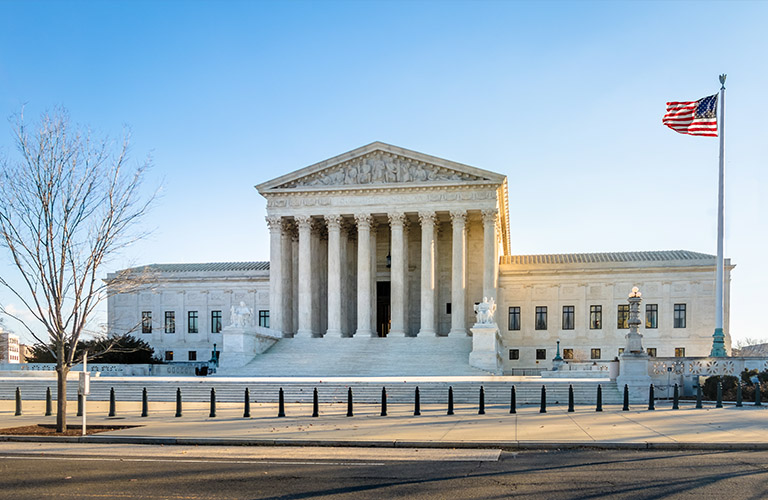
On June 19, 2017, the United States Supreme Court issued a landmark decision in Matal v. Tam, 582 U.S. ____ (2017), unanimously holding the disparagement clause in the Lanham Act unconstitutional on the ground that it violates the First Amendment. This decision upends over 70 years of practice under Lanham Act § 2(a) (15 U.S.C. § 1052(a)). The case will likely have an immediate effect on other pending “derogatory” mark cases, including Blackhorse v. Pro-Football, Inc., 2015 U.S. Dist. LEXIS 90091 (E.D. Va. July 8, 2015) (the “Redskins” case) and may signal the Court’s willingness to find the analogous Lanham Act provision prohibiting registration of “immoral, deceptive, or scandalous matter” unconstitutional as well.
This case concerned the registration of the trademark THE SLANTS, identifying a rock band composed of Asian-American members. The term “slants” is considered to be a derogatory term for Asians, and the band chose this name to “reclaim” the term and weaken its use as a slur. The United States Patent and Trademark Office (“USPTO”) denied registration on the ground that the mark “may disparage . . . persons, living or dead, . . . or bring them into contempt or disrepute” because “there is . . . a substantial composite of persons who find the term in the applied-for mark offensive.” Lanham Act § 2(a); Trademark Manual of Examining Procedure §1203.03(b)(i) (Apr. 2017), p. 1200–150, http://tmep.uspto.gov. The Trademark Trial and Appeal Board (“TTAB”) affirmed the decision. On appeal, an en banc Federal Circuit reversed, finding the disparagement clause unconstitutional. The Supreme Court affirmed the judgment of the Federal Circuit on the same ground.
The First Amendment forbids the government to regulate speech that would favor certain viewpoints, unless it is considered “government speech.” The Court rejected the Government’s argument that trademark registrations are “government speech,” noting that if the Government is expressing itself through the trademarks it registers, then the Government is “babbling prodigiously and incoherently,” “expressing contradictory views” and “endorsing a vast array of commercial products and services.” 582 U.S. ___ (2017) (slip op. at 15). The Court distinguished the primary case relied on by the Government, Walker v. Texas Div., Sons of Confederate Veterans, Inc., 576 U.S. ___ (2015), which affirmed the state of Texas’ refusal to issue specialty license plates on the ground that this service is “government speech.” In addition, adopting this view implies that copyrighted works should also be considered “government speech.”
The Court was also not persuaded that by granting trademark registrations, the Government is providing a subsidy to trademark owners, as it is the trademark applicants that are paying the USPTO for registration. Similarly, the Court rejected the Government’s argument that the disparagement clause should be sustained under the “government-program” doctrine. In summary, the Court held that the First Amendment requires that the government be viewpoint-neutral, and this term must be interpreted broadly. As “[g]iving offense is a viewpoint,” choosing to refuse trademarks that are considered disparaging “is the essence of viewpoint discrimination.” 582 U.S. ___ (2017) (slip op. at 22; 3).
This decision marks not only a victory for Mr. Tam and his band, but also for the Washington Redskins, who have been involved in a battle to retain their REDSKINS trademark registration for decades, most recently in the form of the Blackhorse v. Pro-Football, Inc. litigation, which is currently pending at the Fourth Circuit. As a result of the Supreme Court’s decision, the cancellation case should become moot. This decision could also result in a flood of new trademark applications for so-called “derogatory” marks, including marks that are critical of public officials or other individuals. In addition, we expect that this ruling will be extended to immoral and scandalous marks also mentioned in § 2(a) of the Lanham Act, as it concerns the same First Amendment issues addressed in this opinion.
Click here to see the original article as posted in World Trademark Review.
This client alert is intended to inform clients and other interested parties about legal matters of current interest and is not intended as legal advice. For further information on this ground breaking decision and it’s impact on clients, contact Jim Bikoff or any SGR attorney in the IP Trademark Group.

